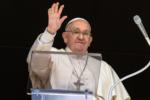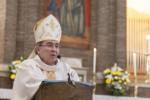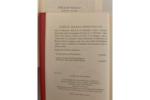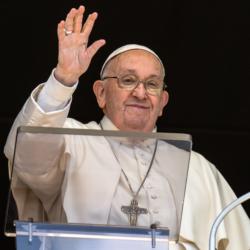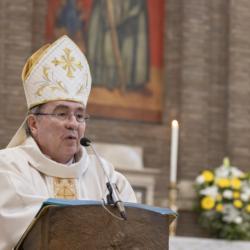Committee to review reconfiguration process
A newly appointed re-configuration review committee will review the ongoing reconfiguration process, not reopen closed parishes, according to Archbishop Seán P. O’Malley. The formation of the committee was announced Oct. 7 and its first meeting was held Oct. 11.
"The purpose of the committee is not to revisit decisions that have already been made," the archbishop said in an Oct. 12 interview. To date, 28 parishes have closed and six more decrees of suppression and one decree of erection were released this week.
There is an appeal process already in place to allow parishes to contest their closure, he added.
The committee’s purpose will be to “take a sampling” and “come up with the best practices that might be invoked in working with parishes that are slated to close and also with receiving parishes,” the archbishop said. “At the same time, we might also identify areas that were troublesome, and where we can learn something from that so as not to repeat our same mistakes over and over again.”
"Some of those closures went very well and others were not soft landings," he added. "They were difficult for people, and I thought it would be helpful to have someone come in with fresh eyes to look at what we had done."
The archbishop said he hopes the committee will finish with its review by the end of January.
Peter Meade, executive vice president at Blue Cross Blue Shield of Massachusetts, and Sister Janet Eisner, president of Emmanuel College, were selected by Archbishop O’Malley as the co-chairs. Meade and Sister Janet independently selected the rest of the committee, they told The Pilot, Oct. 7.
The other committee members are: Marylou Batt, vice president of Lesley University; Jack Connors Jr., chairman of the advertising firm Hill, Holliday; Neal Finnegan, chairman of Citizens Bank of Massachusetts; Donna Latson Gittens, CEO of the communications firm Causemedia, Inc.; Jeanne Lafond, pastoral associate of St. Patrick Parish in Brockton; and Msgr. Dennis Sheehan, pastor of St. Paul Church in Cambridge.
Both Meade and Sister Janet said the committee will review the process and possibly delay closure for some parishes but will not reopen closed parishes.
"The parishes that are closed are closed," said Sister Janet. "We're not talking about reopening them."
The archbishop formed the committee in order to make improvements in the difficult process of reconfiguration, she added.
"It comes from the fact that the archbishop has seen and heard and felt, from his many visits around the archdiocese, just how painful this process has been," said Sister Janet. "He's purposely asked an external group to take a look and see if we can assist him going forward."
"I've been surprised at how difficult and painful this has been," Meade said. "[The archbishop] is dealing with the fact that we don't have the resources to keep the number of parishes we've had in the past open and we don't have the vocations to staff those parishes, and it would be irresponsible to pretend we could do what we can't."
Archbishop O’Malley said the committee’s first meeting was spent “trying to bring everyone up to speed as far as all of the reasons behind reconfiguration and the process that went into place and what some of the considerations were.”
The eight committee members were allowed time for questions.
Despite the establishment of a review committee, the archbishop maintained the necessity of reconfiguration. “The serious reasons for reconfiguration have not changed and the need for this and the need to go forward is still there,” he said. “We are making this sacrifice to strengthen the mission of the Church, to allow us to have stronger parishes, and to be able to be present in all parts of the diocese with the priests and with the material resources that we need.”
"In the Acts of the Apostles no one was in want because everyone was willing to share their resources," he added. "The apostles distributed them so that everyone would have what they needed. This is what we're trying to do in our diocese."
"Some parishes that are closing are parishes that are called viable because they have all the finances they need, but those parishes are being asked to make a sacrifice so that schools and parishes in parts of the diocese where they are not able to survive without help will be able to survive," he continued. "We need to be in those areas."
Although the process itself will continue, the archbishop said there are some areas where it may change. “As I have said from the beginning, we do have an appeals process, and we are open to changing a decision if we get new information about a situation that had not been taken into account and that is of such nature that it indicates that the decision was not the best decision,” he said.
If the new information is “substantial,” reversal of a decision is possible in “very rare instances,” he added.
While the parishes marked for suppression will still close, the committee may determine that more time is needed and postpone a closure, he said.
The committee will not only look at the processes of closing parishes but also at how those parishioners are received in new parishes. “Certainly the work of the archdiocese in supporting welcoming parishes for instance is going to need to go on long after the whole process is over, and we also have areas of the archdiocese where the process is not going to be over for several more months,” he said.
The archbishop said he is grateful to Catholics in Boston affected by reconfiguration. “I’m very, very grateful to the priests and the people and parishes that have been a part of this process — either as closing parishes or as receiving parishes,” he said. “It certainly is a great sacrifice.”

